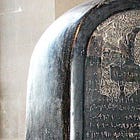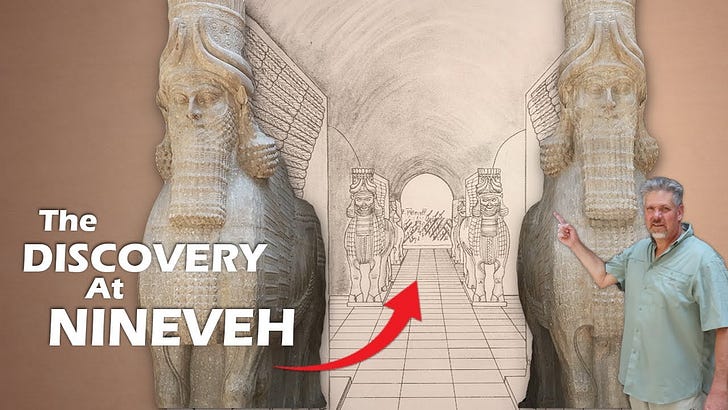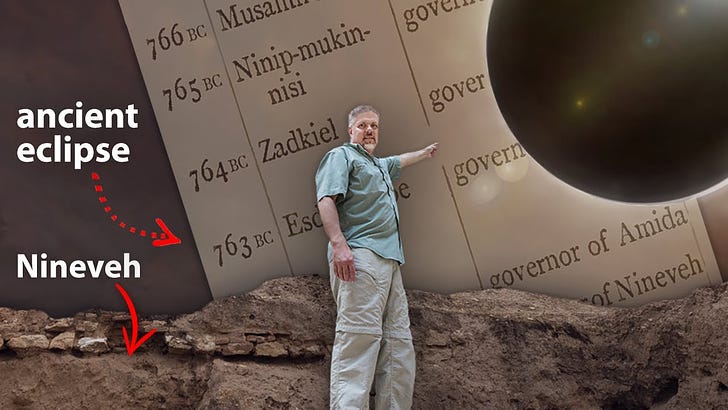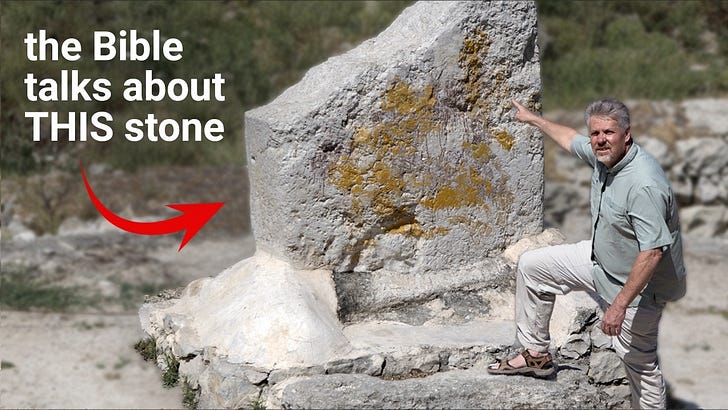Atheist Question #5: How can you believe in something with no scientific evidence?
There's actually quite a bit of scientific evidence.
This is Part 5 of our series on common objections to Christianity. You can find Part 4 here.
Many atheists struggle to reconcile an illusory division between Christianity and “science.” Since the arrival of Modernism and Postmodernism, many people have pushed the idea that Christianity and the Bible aren’t “scientific” and therefore they must be myths. If science can’t measure it or dissect it and ultimately explain it through naturalist causes, they say, then it doesn’t exist. There is a question listed in the 15 Thought-Provoking Questions Atheists Often Wish Christians Would Answer article (the spark for this series) that touches on this thinking. It reads, “How can you believe in something with no scientific evidence?”

What Scientific Evidence Would Be Expected or Believed?
If an atheist asks, “How can you believe in something with no scientific evidence?” the first response should be, “What do you mean by ‘scientific evidence,’ and what sort of ‘scientific evidence’ would you expect to find if Christianity is true? If we found just that sort of evidence, would you believe it?”
In most discussions, that will stop the conversation right there. Most people don’t have any idea what sort of evidence that they would accept as supporting Christianity. They simply have a vague idea that “science” and Christianity are at odds with each other, and therefore there is no scientific support for Christianity.
Further, even if such evidence would be presented, it’s unlikely the atheist would accept it. They would simply move the goal posts and insist that whatever was presented was not enough or not as reliable as they would want.
Many people who ask this question aren’t truly searching for answers; they’re searching for excuses or making a statement in the form of a question. They’re trying to denigrate and undermine the faith of Christians by suggesting that Christianity is a fairy tale, unworthy of sensible, modern people who have seen large advances in science and technology. “We have the Internet and iPhones now,” they say. “We don’t need your ancient myths that talk about sin and salvation. Besides, those myths make me feel bad.”
Are Science and Christianity Actually in Conflict?
One large assumption atheists make is that science and Christianity are opposites, that they cannot both be true and coexist as partners. If you believe in science, then you can’t seriously believe in the Bible, too. And if you believe in the Bible, you must be an uneducated rube.
Unfortunately, when some Christians are confronted with the science versus Christianity framing, they take the bait and fall into the trap. “Science is completely bankrupt and everything it tells you is a lie,” these Christians say. “Light traveling billions of years? Radio carbon dating? Dinosaurs? Bah! It’s all lies!”
Neither of those positions are true. Science and Christianity are actually great together, just the way that God wanted them to be. True science (not “scientism”) is all about the search for truth, and God is the full embodiment of truth. Searching for truth both from the Bible and from science is neither unscientific nor ungodly.
Indeed, many of history’s greatest scientists were also Christians who believed that scientific inquiry was a Christian calling.

Scientists Who Were Christian
Note: I almost titled this section “Christian Scientists,” but I didn’t want anybody confusing this with the Christian-ish cult started by Mary Baker Eddy in 1879, The Church of Christ, Scientist. Definitely not the same thing. Ignore the cult.
The number of Christians in the sciences is huge and has been huge for centuries. I’ve made just a short highlight reel from a larger list on this page, which itself is just a highlight reel of all the Christians through the ages that have worked in the sciences. And this list is focused on just the hard sciences, ignoring things like archaeology.
Physics:
Isaac Newton - A Protestant who discovered the laws of motion and co-invented calculus. He is one of the greatest physicists and mathematicians of all time.
James Clerk Maxwell - An Evangelical Protestant who discovered the equations unifying electricity and magnetism and showed that light was a self-propagating electromagnetic wave.
Werner Heisenberg - A Lutheran who was one of the primary creators of quantum mechanics and who formulated the Uncertainty Principle.
Alessandro Volta - A Roman Catholic who invented the battery and was the first to isolate methane. The electrical unit of the “volt” is named after Volta.
Michael Faraday - An elder in the Sandemanian Church who discovered electromagnetic induction and the first experimental link between light and magnetism. Electrical capacitors are measured in the unit of “farads,” named after Faraday.
Samuel Morse - A Calvinist “with Unitarian sympathies” who developed the first single-wire telegraph and invented Morse Code to communicate using it.
Arthur Compton - A Baptist deacon who found that light can act as both a particle and a wave and coined the name “photon” to describe that particle.
Georges Lemaître - A Roman Catholic priest who discovered that the universe is expanding and formulated the Hubble–Lemaître law. He also proposed that the universe began with the explosion of a “primeval atom” whose matter then spread and forms the universe we see today (an early precursor theory to the Big Bang).
Ernest Walton - A Methodist who said that science was a way of knowing more about God and won the Nobel prize in physics for splitting the atom and proving Einstein’s famous equation,
\(E = mc^2\)Arthur Eddington - A Quaker who proposed that stars are powered by nuclear fusion and experimentally verified Einstein’s General Theory of Relativity.
John Ambrose Fleming - A Christian who invented the vacuum tube, a precursor to the transistor which enabled the electronic age.
Chemistry:
Antoine Lavoisier - A Roman Catholic who was one of the founders of modern chemistry as we know it. He discovered oxygen’s role in combustion and respiration and the fact that water is composed of hydrogen and oxygen.
Robert Boyle - A Christian who said that to understand science more deeply was to glorify God more fully. He defined various elements and discovered the first gas law, Boyle’s Law.
Charles Barkla - A Methodist who believed that science was part of his quest for God and who discovered that atoms have the same number of electrons as their atomic number.
William Thomson (Lord Kelvin) - An elder in the Free Church of Scotland who codified the first two laws of thermodynamics and discovered that absolute zero temperature occurs at -273.15 °C. The Kelvin temperature scale is named after Lord Kelvin.
Biology:
Gregor Mendel - A Roman Catholic abbot who founded the science of genetics and identified many of the rules for heredity, including rules for dominant and recessive traits.
John Eccles - A Christian and “sometimes practicing Roman Catholic” who won the Nobel Prize in Medicine for his study of the physiology of synapses.
Mathematics:
Leonhard Euler - The son of a Calvinist pastor who published more mathematics than any other person in history, much of it quite revolutionary and groundbreaking. Many believe Euler is the greatest mathematician to have ever lived.
Carl Friedrich Gauss - A Lutheran Protestant who believed in a unity between science and God and who broke ground in number theory and invented the Fast Fourier Transform. Those who reject Euler as the greatest mathematician typically believe that Gauss was the greatest mathematician.
Bernhard Riemann - The son of a Lutheran pastor who transformed geometry, paving the way for Einstein’s General Theory of Relativity, and who formulated the Riemann Hypothesis, one of the greatest unsolved problems in mathematics. It is said that he died reciting the Lord’s Prayer.
Blaise Pascal - A Roman Catholic who co-founded probability theory and who devised “Pascal’s Wager” as a justification for believing in God. Also invented the hydraulic press and the mechanical calculator. The Pascal programming language is named after him.
And that’s just a start. There are multiple Nobel Prize winners in there. There are people who blazed trails in fundamental areas of science, both ancient and modern. Some of them, Newton, Volta, Faraday, and Kelvin, even have fundamental physical units named after them. There are no lightweights in that list. There are no also-rans. These are the best of the best, the greatest of the greatest. And all of them were Christian.
Astronomy
Astronomy is one area where science and the Bible continue to agree.
First, the Bible states that God created the heavens and the earth. The Big Bang theory posits that the universe began as an infinitesimal point of density and temperature. All the energy and matter in the universe was compressed into this point, and then, suddenly, it started to expand, flying outwards and making space, time, and the universe we see today.
What was before the Big Bang? We have no idea. Why did the universe start expanding? Science can’t tell us.
But the Bible says repeatedly that God “stretched” or “spread” out the heavens, not once or twice, but more than seven times (this is just a partial list), across multiple books written by multiple authors.
Job 9:8 (ESV):
8 who alone stretched out the heavens
and trampled the waves of the sea;
Isaiah 40:22 (ESV):
22 It is he who sits above the circle of the earth,
and its inhabitants are like grasshoppers;
who stretches out the heavens like a curtain,
and spreads them like a tent to dwell in;
Jeremiah 10:12 (ESV):
12 It is he who made the earth by his power,
who established the world by his wisdom,
and by his understanding stretched out the heavens.
Psalm 104:1–2 (ESV):
O Lord My God, You Are Very Great
104 Bless the Lord, O my soul!
O Lord my God, you are very great!
You are clothed with splendor and majesty,
2 covering yourself with light as with a garment,
stretching out the heavens like a tent.
Isaiah 42:5 (ESV):
5 Thus says God, the Lord,
who created the heavens and stretched them out,
who spread out the earth and what comes from it,
who gives breath to the people on it
and spirit to those who walk in it:
Isaiah 45:12 (ESV):
12 I made the earth
and created man on it;
it was my hands that stretched out the heavens,
and I commanded all their host.
Jeremiah 51:15 (ESV):
15 “It is he who made the earth by his power,
who established the world by his wisdom,
and by his understanding stretched out the heavens.
Note that all of these references were written at least 500 years before Christ. Some people estimate the book of Job to have been written 2000 years before Christ.
How did they know? Well, God knew, because he was there, and he gave them the words to write.
Finally, I’ll leave you with a famous quote from Robert Jastrow, an American astronomer and physicist who worked for NASA and as a futurist author.
For the scientist who has lived by his faith in the power of reason, the story ends like a bad dream. He has scaled the mountains of ignorance; he is about to conquer the highest peak; as he pulls himself over the final rock, he is greeted by a band of theologians who have been sitting there for centuries.
— Robert Jastrow, American astronomer and physicist
Biology
Let’s move onto biology. The creation account in Genesis 1 is often denigrated by atheists as being unserious. Clearly, Genesis 1 is not written to be a scientific text, and sometimes Christians feel ashamed about that and start to suggest that the account is simply a metaphor or at least “not literal.”
A lot of the conflict between science and Christianity seems to be around the issue of the Bible recording the creation of the earth in six days. Even Christians will argue among themselves as to exactly how long it took to create the earth and how old it is. Let’s leave that issue to the side for the moment. I’ll dive into it more deeply in a forthcoming article.
For now, let’s just concentrate on the order of things that the Bible says were created:
On the first day, God creates light and separates it from darkness.
On the second day, the atmosphere and the sky.
On the third, dry ground and plants.
The sun, moon, and stars.
Sea creatures and birds.
Land animals and humans.
Note that the creation order of the living things (plants and animals) is correct according to the fossil record. First plants (day 3), then sea creatures and birds (day 5), and then land animals and finally humans (day 6). The order of birds often causes people a hiccup, but remember that we’re starting to think that birds came from dinosaurs. Aren’t dinosaurs “land animals?” Yes, some surely were, but the “land animals” in Genesis 1:24 talks about “livestock” which suggests a focus on mammals, which did come later.
The other thing that throws people off is that light is created on day 1, but the sun, moon, and stars aren’t created until day 4, after plants. How can plants grow without the sun?
This is resolved if you shift your frame of reference. Typically, when we’re imagining this story, we’re floating inside the solar system but far away from the earth. But what if we were an observer standing on the earth itself? What would things look like to us then? And note that it doesn’t say that the sun, moon, and stars were created on day four. Rather, it says “Let there be…” which could indicate a revealing of something rather than a first creation.
So, if we take that frame of reference and think about how things would have looked if you were standing on the earth, what you would have seen was:
This earth is already created, but is “without form,” and it’s dark. There is already water on the earth. This suggests that this is not talking about creation from the start of the universe, but rather from the start of the earth. Then light appears.
On day 2, God creates the sky and separates the water above from the water below. Thus, we have a cloud layer. It’s not unreasonable to think that this cloud layer was tremendously expansive. Light would get through, but you would not be able to see the sun, moon, or stars.
On day 3, plants could photosynthesize with minimal light.
On day 4, God clears away the clouds and reveals the sun, moon, and stars.
On days 5 and 6, God creates the animals in increasing order of sophistication, culminating in humans.
Again, the Bible is not a scientific text. It’s not trying to describe the creation of the world in a peer-reviewed paper to appear in Nature magazine. Is the Biblical account in contradiction with science? Not if you change your frame of reference to the earth. In that case, it’s pretty good. And it looks great in comparison to other religions like Hinduism that claim that the world is resting on the backs of four elephants who are in turn standing on the back of a giant turtle.
Archaeology
In other religions, the people and places mentioned in their sacred texts are often fictional. Take the Greeks, for instance. While Mount Olympus might be a real place, there is no palace on top of it and Zeus and Hera were not real people.
But the Bible is quite different. When we go looking for the people and places mentioned in the Bible, we often find them.
We’ve covered a lot of archaeological finds that bear on the Bible before:
Joel Kramer’s YouTube channel, Expedition Bible, is one of the best resources I’ve found for this. Joel does a great job taking you through the history, showing you how it relates to the Bible, and then showing you the actual places and artifacts that are part of the story. I highly recommend it.
History
Finally, let’s end with history. Even if archaeology proves that some of the people in the Old Testament were real, how do we know that Jesus was real? And even if he’s real, what evidence do we have that he really rose from the dead?
It turns out that there are many references to Jesus in the historical record.
Firstly, many early church leaders were writing to other people and talking about Jesus, his teachings, and his death and resurrection. These letters were written within a hundred years of Jesus’s death, which means the idea that Jesus rose from the grave wasn’t a medieval creation. Ignoring the apostolic letters that are included in the Bible (letters from Paul, Peter, and John to various churches and people), we also have letters from Clement of Rome (year 70 - 96), Ignatius of Antioch (year 110), Polycarp (year 110 - 140), Justin Martyr (year 155 - 157), Papias (year 95 - 110), and Quadratus (year 117 - 138).
Mara Bar Serapion was taken prisoner by the Romans during a conquest and wrote from his prison cell to his son in the year 73, “What else can we say, when the wise are forcibly dragged off by tyrants, their wisdom is captured by insults, and their minds are oppressed and without defense? What advantage did the Athenians gain by murdering Socrates, for which they were repaid with famine and pestilence? Or the people of Samos by the burning of Pythagoras, because their country was completely covered in sand in just one hour? Or the Jews by killing their wise king, because their kingdom was taken away at that very time? God justly repaid the wisdom of these three men: the Athenians died of famine; the Samians were completely overwhelmed by the sea; and the Jews, desolate and driven from their own kingdom, are scattered through every nation. Socrates is not dead, because of Plato; neither is Pythagoras, because of the statue of Juno; nor is the wise king, because of the new laws he laid down.” The “wise king” that he refers to is obviously Jesus and he states that Jesus at a minimum Jesus is “not dead” because his teachings live on. Serapion might not have believed in Jesus’s resurrection, but he does confirm both his existence and the lasting impact of his teaching.
Pliny the Younger was the Roman governor of Bithynia and wrote to the emperor Trajan in 112 AD about the Christians Pliny was trying to prosecute. He says about them, “But they declared that the sum of their guilt or their error only amounted to this, that on a stated day they had been accustomed to meet before daybreak and to recite a hymn among themselves to Christ, as though he were a god, and that so far from binding themselves by oath to commit any crime, their oath was to abstain from theft, robbery, adultery, and from breach of faith, and not to deny trust money placed in their keeping when called upon to deliver it.” Whatever Pliny believed about the claim, the Christians at that time believed that Christ was real and should be worshipped as God.
In AD 93, the Jewish historian, Josephus, wrote in his book Antiquities of the Jews, “At this time there was a wise man who was called Jesus. His conduct was good, and [he] was known to be virtuous. And many people from among the Jews and the other nations became his disciples. Pilate condemned him to be crucified and to die. But those who had become his disciples did not abandon his discipleship. They reported that he had appeared to them three days after his crucifixion, and that he was alive; accordingly he was perhaps the Messiah concerning whom the prophets have recounted wonders.” Josephus writes as a non-Christian Jew, but he recounts the facts surrounding Jesus’s crucifixion correctly.
Finally, we have Tacitus, who writes in his history, Annals, about the Roman emperor Nero trying to blame the Christians for the fire that burned down Rome that Nero probably started himself. Tacitus writes, “Consequently, to get rid of the report, Nero fastened the guilt and inflicted the most exquisite tortures on a class hated for their abominations, called Christians by the populace. Christus, from whom the name had its origin, suffered the extreme penalty during the reign of Tiberius at the hands of one of our procurators, Pontius Pilatus, and a most mischievous superstition, thus checked for the moment, again broke out not only in Judæa, the first source of the evil, but even in Rome, where all things hideous and shameful from every part of the world find their centre and become popular.” Again, Tacitus is clearly not a believer, but he accurately describes Jesus as having been put to death by Pilate. The “superstition” that he references is probably describing the idea that Jesus rose after being killed.
And there are many other references as well. You can read more here.
There’s no doubt about the basic facts of the gospel accounts:
Jesus was real.
He was crucified at the hands of the Romans after being condemned by Pilate.
His followers believed that Jesus was God.
His followers believed he rose from the dead.
Conclusion
Given all that evidence, it’s hard to take seriously the claim that Christianity is unscientific. Multiple Nobel Prize winners are scientists who were strong Christians. Multiple fundamental scientific units are named after prominent scientist who were strong Christians. We see alignment between Christianity, the Bible, and science in areas such as astronomy, biology, archaeology, and history.
How can I believe in something with no scientific evidence? Well, I don’t. There’s plenty of scientific evidence that supports the Bible’s claims.
If this article spoke to you, leave me a comment and let me know. Your feedback is always appreciated. Does somebody in your life need to read this? Share it with them (Facebook, Twitter, Instagram, Snapchat, etc.)! If this spoke to you, please subscribe to get future articles. And always like and “restack” this post in Substack to help others find it.











Thank you David. Love your teachings.
Really appreciate all the references and examples here, as well as the re-framing of the question in the first place. Lately, it has been seeming to be more productive in my environs to pray for folks to be drawn to Him, in the ways that He knows that will reach them, on His timetable, and to lend me grace when/if they ever broach such things with me. I was raised in the "beat them over the head with the Bible" style long ago, and witnessed that to be very unhelpful, perhaps because it was geared much more for a tally, rather than for our Lord's will. But I know also He can work even through that method, lol. Grateful to you!